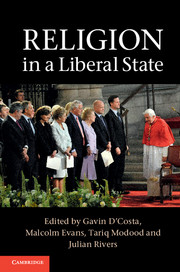Book contents
- Frontmatter
- Contents
- List of contributors
- Acknowledgements
- Introduction
- 1 Religion in a liberal state
- 2 The European Court of Human Rights and religious neutrality
- 3 Religion and sexual orientation: conflict or cohesion?
- 4 Liberal religion and illiberal secularism
- 5 Moderate secularism in liberal societies?
- 6 Excluded, included or foundational?
- 7 Justificatory secularism
- 8 What lacks is feeling: mediating reason and religion today
- 9 Arguing out of bounds: Christian eloquence and the end of Johannine liberalism
- Index
- References
3 - Religion and sexual orientation: conflict or cohesion?
Published online by Cambridge University Press: 05 June 2014
- Frontmatter
- Contents
- List of contributors
- Acknowledgements
- Introduction
- 1 Religion in a liberal state
- 2 The European Court of Human Rights and religious neutrality
- 3 Religion and sexual orientation: conflict or cohesion?
- 4 Liberal religion and illiberal secularism
- 5 Moderate secularism in liberal societies?
- 6 Excluded, included or foundational?
- 7 Justificatory secularism
- 8 What lacks is feeling: mediating reason and religion today
- 9 Arguing out of bounds: Christian eloquence and the end of Johannine liberalism
- Index
- References
Summary
Raymond Plant’s chapter is a powerful argument in favour of rebalancing contemporary debates about religion away from identity politics towards a more traditional liberal concern with preventing harm as the criterion which guides when and how law should regulate religion.
One reason for the popularity of identity politics was the failure of political liberalism to recognize the problems which were inherent in its claims to neutrality and universalism. A range of writers have addressed the problem of ‘difference’ and revealed the way in which the chimera of ‘universalism’ masked the reality of hegemony (Taylor, 1992; Young, 1990). Liberal elites who had greater social, economic and political power than minorities were given yet more power through their control over concepts, language and the ability to define the conceptual categories through which minorities made their legal and political claims. The claim to liberalism’s neutrality and universalism, it was argued, allowed this powerful elite to represent their subjective viewpoints and interests as the truth about all citizens and dominate legal and political discourse irrespective of differences of race, culture and religion or gender and sexuality. The postmodern critique of liberalism, as well as the political ‘identity’ movements which it has inspired, have made an important contribution to revealing these oppressive aspects of traditional liberalism and by increasing our understanding of ‘difference’. This intellectual shift has, in turn, led to refinements within liberal political theory that are more sensitive to ‘difference’ (Phillips, 2007).
- Type
- Chapter
- Information
- Religion in a Liberal State , pp. 67 - 92Publisher: Cambridge University PressPrint publication year: 2013



